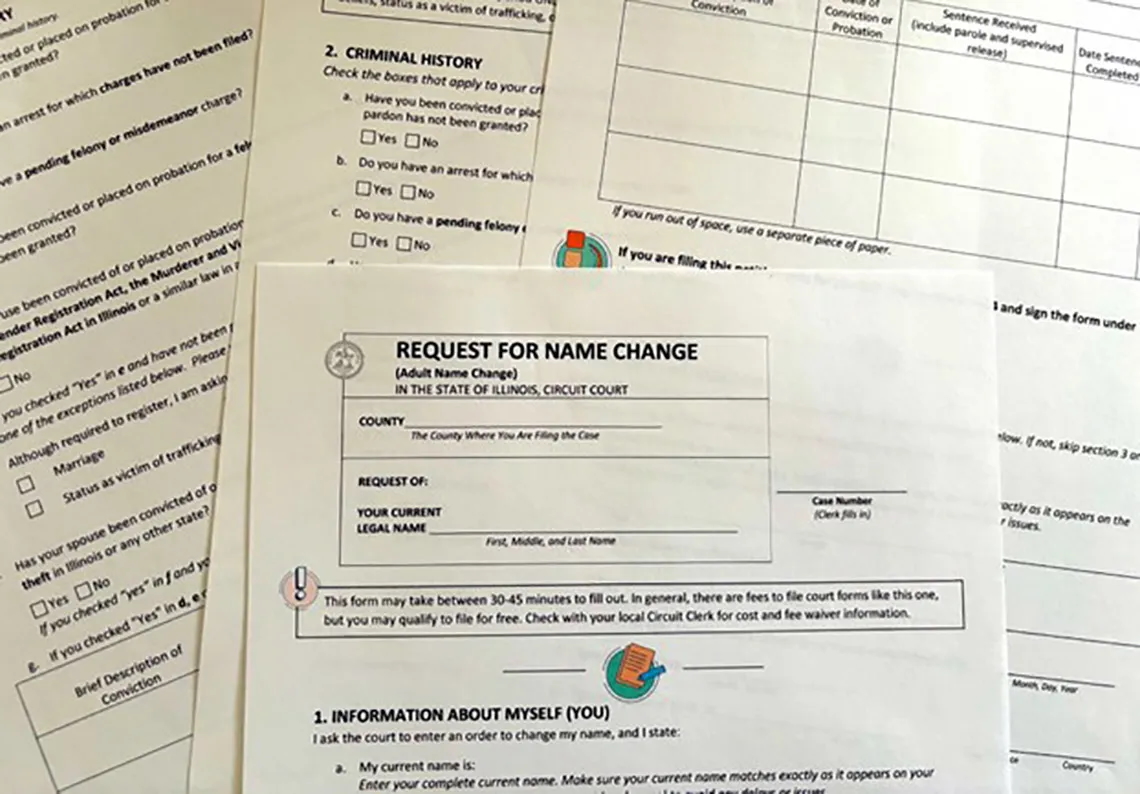Bill before Illinois Senate aims to reduce state requirements for name changes

SPRINGFIELD — Illinois lawmakers in early January could consider easing requirements for residents to change their names, a move proponents say will reduce risks for victims of domestic abuse, transgender residents and others.
The measure must clear the full Senate in the first week of January to reach Gov. JB Pritzker’s desk, otherwise it must go through the entire legislative process again after a new General Assembly convenes Jan. 8.
The bill, House Bill 5164, would eliminate an existing requirement to publish name changes with a local newspaper. It would also reduce the state residency requirement of people wanting to change their name from six months to three months.
“There are residents in our state who do not feel safe when they are an adoptee; they’re transgender; they’re an immigrant; they’re a survivor of domestic violence, survivor of sexual exploitation and human trafficking,” Sen. Ram Villivalam, the bill’s sponsor and a Chicago Democrat, said in an interview. “So they would like to change their name, and in doing so, we need to remove as many barriers as we can to ensure their health and safety.”
The goal of the bill is to decrease threats to people who have endured domestic abuse, discrimination and other threats to their safety. Villivalam said 24 states have already eased this requirement. Planned Parenthood, Equality Illinois and Brave Space Alliance are pushing for the change.
But the Senate’s top Republican, Sen. John Curran, R-Downers Grove, pushed back against the bill. He argued that impounding the records, meaning restricting access to them, should have a higher threshold.
Individuals are allowed to petition the court to impound records if they believe public disclosure would put them in harm’s way. That process allows individuals to self-attest to hardships and says they may – but are not required to – submit documentation.
“Why make it permissive, rather than a requirement, to attach relevant documents to the petition,” Curran said during a November committee meeting.
But Mike Ziri, the director of public policy at Equality Illinois, said impounded records don’t disappear from court records and are not sealed, but rather are selectively available to the involved parties.
“So it’s not a complete sealing. There will still be access to parties and by the clerk, as well,” Ziri said. “In my experience, working with communities, folks who say they’ve experiencing hardship and heartache, they’re not making that up, and they want protection for very good reasons.”
The Republicans who hold a minority in the state senate questioned whether noncitizens with a criminal record could change their names to evade legal consequences as a result of the lowered requirements for a name change.
“Is this creating a loophole for people who are here, who are criminals and part of things involved in the trafficking, involved in all of these nefarious activities that we’ve been reading about?” Sen. Sue Rezin, R-Morris, said.
Ziri said that the self-attestation was for impounding the court records of name changes, not to get the name change itself. Illinois law states that people on the sex offender registry, arsonists and people on the murderer and violent offender against youth list are barred from seeking name changes. The exceptions are marriage, religious reasons, human trafficking or gender identity. He also said a name change still requires the signature of a judge, and the process can take months.
“Changing your name does not allow you to escape the criminal record. That was legislation that was passed two years ago,” Ziri said. “That’s on top of the other requirement state police already have to check the criminal records with the name change granted months later.”
Villivalam said this bill takes Illinois “another step forward” in ensuring the health and safety of residents.
“Now, more than ever – given the rise in hate and discrimination across the board – people you know feel targeted. So the legislative work that we can do to reassure them on their safety and health is part of our job,” Villivalam said in an interview. “As people continue to feel the hate, feel the discrimination, get targeted, we need to continue to take these steps to make sure they feel healthy and safe.”
Atmika Iyer is a graduate student in journalism with Northwestern University’s Medill School of Journalism, Media, Integrated Marketing Communications, and a Fellow in its Medill Illinois News Bureau working in partnership with Capitol News Illinois.
Capitol News Illinois is a nonprofit, nonpartisan news service that distributes state government coverage to hundreds of news outlets statewide. It is funded primarily by the Illinois Press Foundation and the Robert R. McCormick Foundation.
This article first appeared on Capitol News Illinois and is republished here under a Creative Commons license.
Miss Clipping Out Stories to Save for Later?
Click the Purchase Story button below to order a print of this story. We will print it for you on matte photo paper to keep forever.

